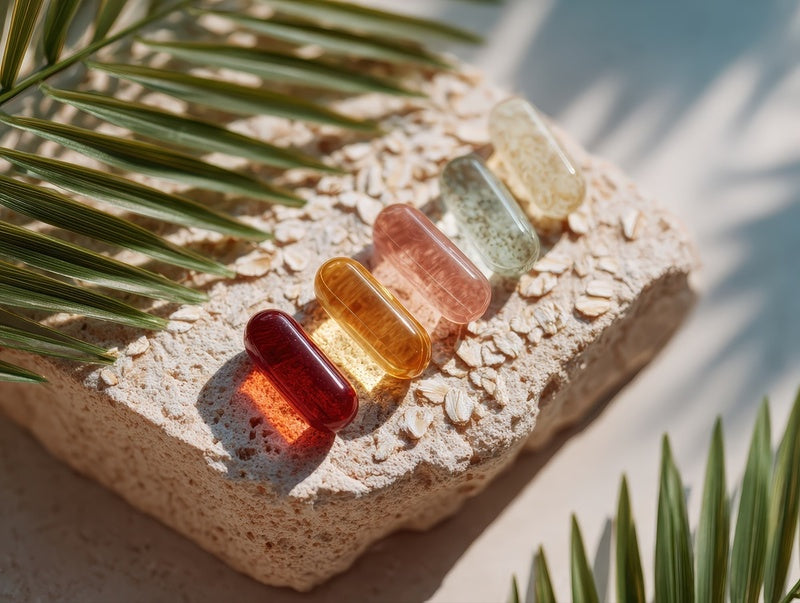Safe intake of dietary supplements – what is worth taking as a dietary supplement in summer?
Content:
- Safe supplementation – what should you always remember?
- What is worth supplementing in summer?
- How to sensibly introduce dietary supplements in summer?
Summer is a time of lightness, increased physical activity, and an abundance of fresh fruits and vegetables. Theoretically, our diet should be the most varied and nutrient-rich during the warmer months. Nevertheless, many people wonder whether taking dietary supplements in summer is worthwhile. The answer is: Yes – but wisely and consciously. Dietary supplementation in summer has its own specific rules and requirements that differ from those in autumn and winter. Below, we explain how to safely integrate dietary supplements into your daily routine, what to pay attention to, and which ingredients can be particularly supportive during the summer months.
Safe supplementation – what should you always remember?
Before reaching for a specific preparation, it's worth highlighting some general rules:
- The dietary supplement does not replace a balanced diet – it is a supplement and not a replacement for healthy meals.
- Dosage matters – 'more' does not mean 'better'. Too much vitamin or mineral can be just as harmful as too little.
- Consultation with a doctor or nutritionist is particularly recommended if you take medications, are pregnant, breastfeeding, or have a chronic illness.
- The quality of the dietary supplement is crucial – choose products from proven manufacturers, with appropriate certificates and precise composition.
What is worth supplementing in summer?
Electrolytes and minerals
High temperatures, intense physical activity, and natural water loss through sweating particularly often lead to water and electrolyte imbalances in summer. Taking sodium, potassium, magnesium, and calcium helps maintain adequate hydration, supports the nervous system, and protects against fatigue.
Vitamin D – is it necessary even in summer?
Many people assume that vitamin D is unnecessary in summer because the body synthesizes it through sun exposure. In fact, 15–20 minutes daily in the sun without sunscreen may be sufficient, but not everyone has such opportunities. Office work, the use of strong UV filters (important for the skin!), or living in northern regions can result in vitamin D levels being insufficient even in summer. Therefore, it's worth testing your vitamin D levels and, if necessary, continuing to take supplements.
Antioxidants – protection against oxidative stress
Strong UV radiation increases the production of free radicals in the body. To protect cells from oxidative stress, it's worth taking antioxidants. Particularly valuable are:
- Vitamin C – supports the immune system and collagen production,
- Vitamin E – called the vitamin of youth, protects the skin,
- Selenium and zinc – minerals that support the immune system,
- Plant extracts (e.g., Green Tea, Turmeric, Resveratrol).
Omega-3 fatty acids
Although consumption of fish and fresh produce is encouraged in summer, many people still suffer from omega-3 fatty acid deficiency. These fatty acids are important for brain and heart function and have anti-inflammatory effects. Supplementing with fish or algae oil can be a valuable addition to your summer diet.
Probiotics
Dietary changes, travel, and restaurant visits can disrupt the balance of gut flora. Probiotics and prebiotics help maintain healthy gut flora and support the immune system as well as digestion. They can be particularly helpful in summer when we tend to reach for cold drinks, ice cream, and exotic foods.
How to sensibly introduce dietary supplements in summer?
- Tailor your supplements to your lifestyle – physically active people need more electrolytes and magnesium, while those working indoors might want to focus on vitamin D.
- Introduce dietary supplements gradually – it's not necessary to take multiple products simultaneously. Rather choose what you really need.
- Pay attention to interactions – some ingredients can compete with each other in high doses (e.g., zinc and copper), so balance is crucial.
- Be regular – Dietary supplements yield results when taken systematically and not occasionally.
Dietary supplementation in summer isn't necessary for everyone, but in many cases can significantly enhance well-being, support the body, and maintain balance during times of increased activity and heat. The most commonly recommended supplements include electrolytes, vitamin D (depending on individual needs), antioxidants, omega-3 fatty acids, and probiotics. However, keep in mind that the most important source of vitamins and minerals should be a varied, fresh diet. Dietary supplements are merely meant to complement this.
If you're wondering which dietary supplements to choose in the summer, choose quality and those tailored to your needs – then the summer months will not only be delicious but also healthy and full of energy.
THE PUBLISHER'S CHOICE
Dried dates 1 kg BIOGO
- €4,21
€4,95- €4,21
- Unit price
- / per
Almonds 1 kg BIOGO
- €11,69
€13,75- €11,69
- Unit price
- / per
Peeled sunflower seeds 1 kg BIOGO
- €3,04
€3,57- €3,04
- Unit price
- / per
Dried organic mango 400 g BIOGO
- €10,99
- €10,99
- Unit price
- / per
Dried White Mulberries 500 g ORGANIC
- €5,84
€6,87- €5,84
- Unit price
- / per
Popcorn (corn kernels) organic 1 kg BIOGO
- €5,84
- €5,84
- Unit price
- / per
Organic Ground Turmeric 500 g BIOGO
- €5,92
- €5,92
- Unit price
- / per
Milk thistle seeds 1 kg BIOGO
- €3,99
- €3,99
- Unit price
- / per
Organic cashew nuts 1 kg BIOGO
- €19,99
- €19,99
- Unit price
- / per
Unpeeled buckwheat groats 1 kg BIOGO
- €2,81
€3,31- €2,81
- Unit price
- / per







































































































































